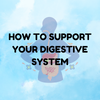
Last Chance for DERMA E Sale! November Promo!
, 4 min reading time

, 4 min reading time
Now is your last chance! DERMA E is only on sale for a few more days! Use code 'TNADERMA' to save 20% off your DERMA E order!
November is almost here! In November we will be spotlighting Enzymedica and Digestion Support! Great for the holiday season! Stay in touch to find out more!
Nurturing Digestive Health: Tips and Strategies for Optimal Digestion
Digestive health is a fundamental aspect of overall well-being, influencing everything from nutrient absorption to immune function and emotional health. A well-functioning digestive system is crucial for breaking down food, absorbing nutrients, and eliminating waste. However, many people experience digestive discomfort or issues at some point in their lives.
Prioritize a Balanced Diet
A well-balanced diet is foundational for good digestive health. Incorporating a variety of nutrient-dense foods can help keep your digestive system running smoothly.
Fiber plays a crucial role in maintaining regular bowel movements and preventing constipation, making fiber-rich foods an essential part of a healthy diet. Fruits, vegetables, whole grains, legumes, and nuts not only support healthy digestion but also promote a thriving gut microbiome. In addition to fiber, the gut benefits from prebiotics and probiotics. Prebiotics, found in foods like garlic, onions, bananas, and asparagus, are non-digestible fibers that nourish beneficial gut bacteria. Probiotics, on the other hand, are live bacteria that help maintain a healthy gut flora and can be found in foods such as yogurt, kefir, sauerkraut, and kimchi. Staying hydrated is equally important, as drinking plenty of water aids digestion by breaking down food for nutrient absorption and helping to move waste through the digestive tract. Lastly, consuming balanced meals that include a mix of protein, carbohydrates, and healthy fats is vital for overall digestive health. It’s advisable to limit the intake of processed foods and sugary snacks, as these can lead to digestive disturbances. Together, these components contribute significantly to maintaining a healthy digestive system.
Practice Mindful Eating
How you eat can be just as important as what you eat, and adopting mindful eating practices can significantly improve digestion and overall satisfaction. One key practice is to eat slowly; by chewing your food thoroughly and taking your time, you allow your body to break down food more effectively. This also gives your brain the necessary time to signal feelings of fullness, which can help prevent overeating. Additionally, portion control plays a crucial role in digestive health; consuming large meals can overwhelm the digestive system and lead to discomfort, so opting for smaller, more frequent meals can help avoid overloading your digestive tract. Lastly, it's wise to avoid eating late at night, as consuming food close to bedtime can interfere with digestion and disrupt sleep. Aim to finish your last meal at least two to three hours before going to bed to promote better digestion and rest.
Manage Stress
Stress can significantly impact digestive health, often leading to issues such as irritable bowel syndrome (IBS), indigestion, and changes in appetite. To manage stress and its effects on digestion, various strategies can be effective. Relaxation techniques, including deep breathing, meditation, and yoga, can help reduce stress levels and promote a more relaxed digestive system. Regular exercise is also beneficial, as physical activity stimulates peristalsis—the movement of the intestines that helps propel food through the digestive tract. Additionally, prioritizing adequate sleep is crucial for overall health and can positively influence digestive function; aiming for 7-9 hours of quality sleep each night supports the body's natural rhythms and enhances digestive processes. Implementing these practices can help mitigate the negative effects of stress on digestion and improve overall well-being.
Considering Digestive Supplements
Certain supplements can provide additional support for digestion, particularly when dietary changes alone are insufficient. One commonly used option is digestive enzymes, which aid in breaking down proteins, fats, and carbohydrates, facilitating nutrient absorption; these supplements are especially helpful for individuals with enzyme deficiencies or digestive disorders. Probiotics are another valuable supplement; in addition to consuming probiotic-rich foods, probiotic supplements can replenish beneficial gut bacteria, particularly after antibiotic use or episodes of digestive disturbance. For those not obtaining enough fiber from their diet, fiber supplements can help maintain regular bowel movements and prevent constipation. Additionally, peppermint oil, known for its soothing properties, can alleviate symptoms of bloating and indigestion and may be particularly beneficial for individuals with irritable bowel syndrome (IBS). Incorporating these supplements can enhance digestive health and overall well-being.
If you are interested in learning more about digestion, support, and supplements, call or click today!
Interested in learning more? Stop by our store or visit our website for to see any other supplement you might be interested in! We carry a large selection on Organic Supplements, Natural Health Supplements, Organic Vitamins, and Herbal Supplements!
To view all of our products, take a look here!



